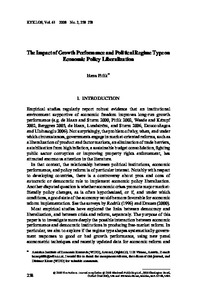The impact of growth performance and political regime type on economic policy liberalization

Kyklos. International Review for Social Sciences
2008
61
2
258-278
economic growth ; economic policy ; political system
Economic development
English
Bibliogr.
"While economic policy liberalization is a key to higher overall growth, reforms are often not implemented due to a fierce opposition from politically powerful prospective losers from reforms. In this respect, it is frequently claimed that economic crises can help overcome resistance to policy liberalization. Furthermore, political authorities not constrained by democratic checks and balances are supposed to be more decisive and are thus expected to carry out market-friendly policy change in times of crises more easily. Rules of democratic participation and checks and balances may however also be good for policy reform, as they can serve as an institutional mechanism for peaceful conflict resolution.
The paper investigates empirically the interaction between economic growth performance and political institutions in producing free-market reform. We explore whether political regime types shape systematically government policy responses to good or bad growth performance, employing panel econometric techniques and using recently updated data for economic reform and political institutions. Contrary to conventional wisdom we find that a bad growth performance is conducive to reforms in democracies, but not in autocracies. Democracies not only carry out more liberal economic policies in general, but they are also more responsive to economic growth crises. Democratic rule seems to be favorable for policy liberalization, but a very good growth performance weakens liberalization incentives considerably."
Digital
The ETUI is co-funded by the European Union. Views and opinions expressed are however those of the author(s) only and do not necessarily reflect those of the European Union or the ETUI.